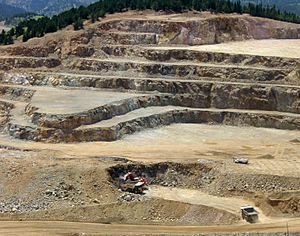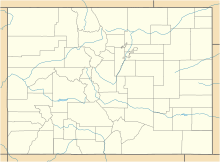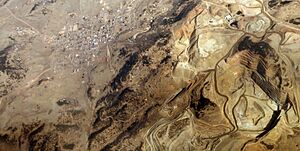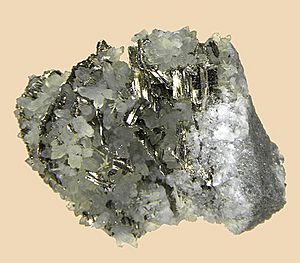- This page was last modified on 18 January 2026, at 13:32. Suggest an edit.
Cripple Creek & Victor Gold Mine facts for kids

Cripple Creek & Victor open-pit
|
|
| Location | |
|---|---|
| Location | Teller County, near Cripple Creek and Victor |
| State | Colorado |
| Country | United States |
| Coordinates | 38°43′38″N 105°08′40″W / 38.72722°N 105.14444°W |
| Production | |
| Products | Gold |
| Production | 322,000 troy ounces |
| Financial year | 2019 |
| Type | Open pit (ex-underground) |
| Greatest depth | 2,750 ft (840 m) |
| History | |
| Opened | 1892 |
| Owner | |
| Company | Newmont Corporation |
| Website | Cripple Creek & Victor website |
| Year of acquisition | 2015 |
The Cripple Creek & Victor Gold Mine is a very active gold mine in Colorado, USA. It's located near the towns of Victor and Cripple Creek. This mine is famous for being the richest gold mine in Colorado's history. It's also the only major gold producer still working in the state today!
In 2019, the mine produced a huge amount of gold: 322,000 troy ounces. That's like weighing gold in a special way, often used for precious metals. The mine also has a lot of gold left to find, with about 3.45 million troy ounces of gold still in the ground.
This mine uses a method called open-pit mining. This means they dig a very large hole in the ground to get to the gold. After digging, they use a process called heap leaching to get the gold out of the rock. The Cripple Creek & Victor mine has one of the biggest heap leach pads in the world!
You can even visit the mine! They have a special visitor center. Here, you can learn about how modern mining works. You can also see old photos, rock samples, and learn about how minerals are used. If you plan ahead, you can even take a tour of the mine through the Victor Lowell Thomas Museum.
Contents
What is the Gold Made Of?
The gold at the Cripple Creek & Victor mine is found in special kinds of rocks. These rocks are called volcanic rocks. They were formed a very long time ago, when volcanoes were active in the area. The gold is found in tiny pieces, sometimes as pure gold. Other times, it's mixed with silver and a chemical element called tellurium, forming "gold-silver tellurides."
Other minerals found with the gold include pyrite (often called "fool's gold"), quartz, and fluorite. These minerals help geologists understand where the gold might be.
A Look Back: History of the Mine
Gold mining in this area started way back in the 1890s. Back then, miners mostly dug underground tunnels to find rich veins of gold. Since 1890, over 23 million ounces of gold have been found in this mining district. Imagine how much that would be worth today!
The Cripple Creek & Victor Gold Mine began when a group of people, including Warren, Harry, and Frank Woods, bought some land in 1892. They started the Mt. Rosa Mining, Milling and Land Company. This company eventually grew into the Cripple Creek & Victor Gold Mine we know today.
Over time, many smaller mines in the Cripple Creek area joined together. A long tunnel, called the Carlton Tunnel, was finished in 1941. This tunnel was 6.5 miles long! Its main job was to drain water from the mines, allowing miners to dig even deeper. A special mill, the Carlton Mill, opened in 1951. It helped process the gold ore.
If you like trains, you might be interested to know that the Cripple Creek and Victor Narrow Gauge Railroad opened in 1967. It's still a fun tourist attraction today!
The current open-pit mining started in 1995. The mine was owned by a company called AngloGold Ashanti for a while. Then, in 2015, it was sold to Newmont Mining Corporation, which owns it now.
This mine is known for digging up a lot of rock to get a smaller amount of gold. This means it's a "low-yield" mine, but it's also "low-cost" to operate. In recent years, the mine has produced about 5% of AngloGold Ashanti's total gold worldwide. It's their only active mine in the United States.
The Amazing Cresson Vug
One of the most exciting discoveries at the mine happened on November 24, 1914. A miner named Dick Roelofs was exploring the mine when they blasted open a huge, gold-filled cave! This cave was called a "vug."
The vug was enormous: 14 feet wide, 23 feet long, and 36 feet high. It took a whole month to empty it! From this one amazing cave, miners found an incredible 60,000 troy ounces of gold. Imagine finding a cave sparkling with so much gold!
Another similar discovery happened in 1953 at the Ajax Mine. Miners found two more "Aladdin's caves of gold." The walls of these caves were covered in shiny gold minerals like Sylvanite and Calaverite. The mine superintendent said it was "a sight a mining man may see but once in a lifetime..."
How Much Gold is Produced?
Here's a look at how much gold the mine has produced since 1995:
| Year | Production | Grade | Cost per ounce |
| 1995 | 76,587 ounces | ||
| 1996 | 174,600 ounces | ||
| 1997 | 228,164 ounces | ||
| 1998 | 230,300 ounces | ||
| 1999 | 231,000 ounces | ||
| 2000 | 248,000 ounces | ||
| 2001 | 214,010 ounces | ||
| 2002 | 224,988 ounces | ||
| 2003 | 283,866 ounces | 0.67 g/t | US$ 199 |
| 2004 | 329,030 ounces | 0.61 g/t | US$220 |
| 2005 | 329,625 ounces | 0.62 g/t | US$230 |
| 2006 | 283,486 ounces | 0.54 g/t | US$248 |
| 2007 | 282,000 ounces | 0.53 g/t | US$269 |
| 2008 | 258,000 ounces | 0.49 g/t | US$309 |
| 2009 | 218,000 ounces | 0.46 g/t | US$376 |
| 2010 | 235,000 ounces |
Gallery
-
This is the bottom of the Cresson Pipe pit. You can see a dike (a sheet of rock) in the middle.











